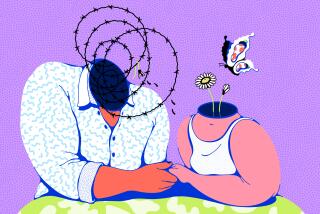Gauging the Power of ‘Attractiveness Factor’
People pay more attention to what women say when they look attractive, according to Scripps College psychology professor Lynn Carol Miller, who designed an experiment to be reported in a scientific journal. The test used makeup to change image.
Miller made three videotapes of the same woman playing a role in which she talked about her marriage, parenthood and career achievements to two women friends in a dramatic sketch about a class reunion. Using a makeup artist, the woman was made to look attractive, unattractive and average. The three films were shown to separate audiences of college-aged men and women and the viewers were then given questionnaires containing statements, some accurate and some made up, and asked to identify which statements the woman in the videotape had made.
“Our findings showed that the more attractive the woman appeared, the more the viewers accurately remembered what she said,” Miller said. “And that was equally true for viewers who were female as well as for those who were male. . . . In general, this may mean that if you want people to remember what you say, you should make yourself as attractive as you can.” The finding confirms other studies that indicate people leave a more lasting impression if they are “moderately conspicuous”--for example, what a person says probably leaves a stronger impression if they stand out from a group by being the only woman or the group’s minority of one in some other way such as race.
Miller concluded that the “attractiveness factor” would be applicable to first-impression encounters such as job interviews and also in any relationship in which a woman is trying to get her point across.
An Unresolved Question However, whether beauty is a blessing or a curse is a question that started at least as long ago as Helen of Troy, and appears unlikely to be solved overnight by psychologists. For example, there are Thomas F. Cash and Louis H. Janda of Old Dominion University in Norfolk, Va., who are writing a book on the psychology of physical appearance. They did one study in which they showed applications with photographs of equally qualified businesswomen in various grooming styles to male and female executives from more than 200 corporations and asked for evaluations of the applicants’ potential in the corporate world. In their report in Psychology Today, Cash and Janda concluded that “if a woman wants to succeed in a man’s world, she had better not look too feminine.”
The choices made by both male and female corporate personnel people on the basis of the photographs indicated that women who were more plain in grooming and dress were perceived to be more competent. While the women in the photographs were seen as equally attractive by the respondents, an appearance of “femininity” appeared to call up extremely stereotypical and biased definitions of the term. “Specifically, candidates groomed in a more feminine style were perceived to be less managerial,” the psychologists wrote, “less intrinsically interested in work; less likely to be taken seriously by others; more illogical and overemotional in decision-making; less financially responsible; more helpless and dependent on the influences of others; sexier and more flirtatious in social relations; less assertive, independent and self-confident than those groomed in a less sex-typed style.”
Similar Results With Men Seen Miller said she thought that if her studies were expanded to men, the results would be much the same: that men perceived as more attractive would receive more attention to what they say.
Cash and Janda’s research does not address the question of attractiveness per se, but suggests a question of appearance that goes deeper--that a woman’s very gender “looks wrong” in the workplace. “Many people, both men and women, who are seriously offended and concerned by the sexism in our society never question this dress-for-success formula, which has different standards for men than it does for women,” they said. “Men must follow certain clothing norms in the office in regard to neatness and formality, but not masculinity. No one would suggest to a man that he try not to look too masculine when he shows up at the office or expect him to comb his hair one way for the office and another way when he goes out to dinner. It is doubtful that any man has ever been advised not to look too good if he wants to be taken seriously at the next board meeting.”
-- -- --
A majority of American women believe that sex discrimination in the workplace has increased in the last year. According to a national sampling projectable to the U.S. female population that was commissioned by Glamour magazine, the numbers of women who believe they are experiencing discrimination in hiring, promotion and salaries has sharply increased since similar surveys were conducted in 1982 and 1983.
In 1984, almost 61% of women said they believed they faced discrimination in getting a job, up from 54% in 1983 and 56% in 1982. Nearly 82% said they believed salary differentials based on sex have increased, as compared to 76% in 1982. The women also reported what they perceived as increased discrimination in job advancement and admission to graduate schools.
Ironically, the respondents expressed far less worry about the state of the economy than they did in preceding years, but more worry about their own careers, perhaps a further indication of a belief that women are unlikely to receive a fair share in economic good times. In 1982, 82% of women expressed worry about the economy; in this year’s survey, conducted in August, this was down to 58%. However, a majority believed that poverty has increased during the last year and that the level of unemployment is unacceptably high. Both of these problems affect women disproportionately.





